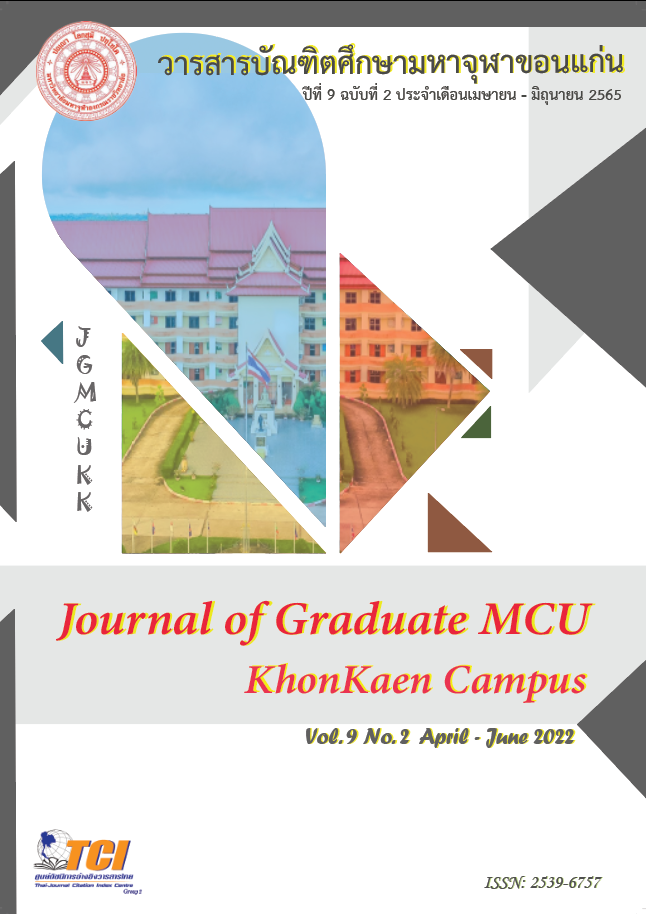แนวทางการบริหารวิชาการแบบมีส่วนร่วมตามหลักบุญกิริยาวัตถุ 3 ของสถานศึกษา สังกัดสำนักบริหารงานการศึกษาพิเศษ ในจังหวัดขอนแก่น แนวทางการบริหารวิชาการแบบมีส่วนร่วมตามหลักบุญกิริยาวัตถุ 3 ของสถานศึกษา สังกัดสำนักบริหารงานการศึกษาพิเศษ ในจังหวัดขอนแก่น
Main Article Content
บทคัดย่อ
การวิจัยครั้งนี้มีวัตถุประสงค์ 1) เพื่อศึกษาการบริหารวิชาการแบบมีส่วนร่วมตามหลักบุญกิริยาวัตถุ 3 ของสถานศึกษา สังกัดสำนักบริหารงานการศึกษาพิเศษ ในจังหวัดขอนแก่น 2) เพื่อเสนอแนวทางการบริหารวิชาการแบบมีส่วนร่วมตามหลักบุญกิริยาวัตถุ 3 ของสถานศึกษา สังกัดสำนักบริหารงานการศึกษาพิเศษ ในจังหวัดขอนแก่น ผู้วิจัยกำหนดกลุ่มตัวอย่างรวมทั้งสิ้น 194 คน กลุ่มผู้ให้ข้อมูลหลักจากการสัมภาษณ์ 3 คน เครื่องมือที่ใช้ในการวิจัย คือ แบบสอบถาม และแบบสัมภาษณ์ มีค่าความเชื่อมั่นทั้งฉบับ เท่ากับ 0.97 สถิตที่ใช้ในการวิเคราะห์ข้อมูล ได้แก่ ค่าความถี่ ค่าร้อยละ และค่าส่วนเบี่ยงเบนมาตรฐาน
ผลการวิจัยพบว่า
1) การบริหารวิชาการแบบมีส่วนร่วมตามหลักบุญกิริยาวัตถุ 3 ของสถานศึกษา สังกัดสำนักบริหารงานการศึกษาพิเศษ ในจังหวัดขอนแก่น โดยภาพรวมมีระดับการปฏิบัติเฉลี่ยอยู่ในระดับมากและเมื่อจำแนกเป็นรายด้าน ด้านที่มีค่าเฉลี่ยสูงสุด คือ ด้านการจัดการเรียนการสอน รองลงมา คือ ด้านการนิเทศภายในสถานศึกษา มีการปฏิบัติอยู่ในระดับมาก ส่วนด้านการพัฒนาหลักสูตรสถานศึกษา และด้านการวัดและประเมินผลการศึกษา มีการปฏิบัติอยู่ในระดับมาก มีค่าเฉลี่ยต่ำสุด
2) แนวทางการบริหารวิชาการแบบมีส่วนร่วมตามหลักบุญกิริยาวัตถุ 3 ของสถานศึกษา สังกัดสำนักบริหารงานการศึกษาพิเศษ ในจังหวัดขอนแก่น ผู้บริหาร ครูและบุคลากร ควรมีส่วนร่วมในการปรึกษา วางแผน ติดตาม ประเมินผล ปรับปรุง และพัฒนา โดยอาศัยหลักบุญกิริยาวัตถุ 3 ประกอบด้วย 1) ทานมัย คือ การให้ทาน ผู้บริหาร ครูและบุคลากร ควรเปิดโอกาสให้ผู้อื่นได้มีส่วนร่วมในการทำงาน แสดงความยินดี ยอมรับเห็นชอบในการทำงานซึ่งกันและกัน 2) ศีลมัย คือ การรักษาศีล ผู้บริหาร ครู และบุคลากร ควรมีการช่วยเหลือ เพื่อพัฒนางานให้ประสบความสำเร็จ และ 3) ภาวนามัย คือ การอบรมจิตใจผู้บริหาร ครูและบุคลากร ควรมีการฝึกอบรมพัฒนา มีการรับข้อมูลที่เป็นประโยชน์ต่อการทำงานการให้คำแนะนำ ให้ความรู้แก่ผู้ร่วมปฏิบัติงาน เพื่อให้บรรลุวัตถุประสงค์ของงาน
Article Details

อนุญาตภายใต้เงื่อนไข Creative Commons Attribution-NonCommercial-NoDerivatives 4.0 International License.
เอกสารอ้างอิง
จันทรานี สงวนนาม. (2553). ทฤษฎีและแนวปฏิบัติในการบริหารสถานศึกษา. (พิมพ์ครั้งที่ 3). นนทบุรี: สำนักพิมพ์ บุ๊ค พอยท์.
ประพิศ โบราณมูล. (2554). การปฏิบัติตนตามหลักธรรมบุญกิริยาวัตถุ 3 ของข้าราชการครูในโรงเรียนเทศบาล สังกัดเทศบาลเมืองร้อยเอ็ด จังหวัดร้อยเอ็ด. วารสารสถาบันวิจัยญาณสังวร มหาวิทยาลัยมหามกุฏราชวิทยาลัย, 2(1), 50-59.
ปรียาพร วงศ์อนุตรโรจน์. (2553). การบริหารงานวิชาการ. กรุงเทพฯ: ศูนย์สื่อเสริมกรุงเทพมหานคร.
พระพรหมคุณาภรณ์ (ป.อ. ปยุตฺโต). 2550. พจนานุกรมพุทธศาสตร์ ฉบับประมวลธรรม. (พิมพ์ครั้งที่ 15). กรุงเทพฯ: สำนักพิมพ์จันทร์เพ็ญ.
พระราชบัญญัติการศึกษาแห่งชาติ พ.ศ. 2542 และแก้ไขเพิ่มเติม (ฉบับที่ 2) พ.ศ. 2545. ราชกิจจานุเบกษา เล่ม 119 ตอนที่ 123 ก, 19 ธันวาคม 2545.
พระหนูกัน กตคุโณ (ฤาวิเศษ). (2558). การศึกษาการสร้างบารมีตามหลักบุญกิริยาวัตถุ 3 ของชาวบ้านหนองแวงตอตั้ง ตำบลคึมชาด อำเภอหนองสองห้อง จังหวัดขอนแก่น. วารสารวิชาการธรรมทรรศน์, 14(3), 163-173.
ไพฑรู สินลารัตน์. (2558). ปฏิรูปการเรียนรู้ : ปฏิรูปการศึกษากลับทางจากล่างขึ้นบน. กรุงเทพฯ: สำนักงานเลขาธิการคุรุสภา.
ลักษณวัต ปาละรัตน์. (2563). การใช้หลักศาสนธรรมในพระพุทธศาสนาเพื่อการพัฒนาตน : กรณีศึกษา นักศึกษาที่เข้าเรียนวิชาพระพุทธศาสนาเบื้องต้น มหาวิทยาลัยรามคำแหง. วารสารวิจัยรามคำแหง (มนุษยศาสตร์และสังคมศาสตร์), 23(2), 33-44.

